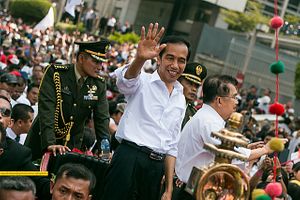Over the weekend, when Indonesian President Joko “Jokowi” Widodo was officially inaugurated for a second time following his reelection victory earlier this year, he did so amid heightened security, with a wave of detentions by security personnel due to suspicions of terror plots. The atmosphere reinforced the reality that the terrorism threat continues to loom over Indonesia even as attention shifts to Jokowi’s second five-year term.
As I have noted before in these pages and elsewhere, Indonesia is no stranger to the threat of terrorism. For instance, in the 2000s, Jemaah Islamiyah (JI), regarded as the Southeast Asian offshoot of al-Qaeda, was held responsible for some of the deadliest terror attacks in the subregion, including the 2002 Bali bombings.
Terrorism fears have continued on under Jokowi’s tenure as well since he was first elected in 2014. During Jokowi’s first term, the threat of terrorism has been once again heightened in Southeast Asia amid the rise of the Islamic State and other related groups as well including JI, with attacks including in Jakarta in January 2016 and in Surabaya in 2018. While the Indonesian government has been attempting to undertake a range of measures to address the threat – including arrests and crackdowns of militants, strengthening legal tools available for security forces to handle suspected terrorists and sympathizers, increasing the attention to deradicalization efforts, and promoting regional and subregional cooperation in areas such as intelligence sharing – concerns remain.
As Jokowi is inaugurated for the start of his second term, the terrorism threat still looms large over Indonesia amid broader questions about the future of its domestic and foreign policy. Earlier this month, Indonesia’s chief security minister Wiranto was stabbed by what police identified as a member of a pro-Islamic State group in an alarming development that reinforced the vulnerability of the country to the threat at the highest levels. Furthermore, ahead of Jokowi’s inauguration, Indonesia detained dozens of suspects, in part due to a suspicion of potential terror plots.
The terrorism threat is likely to remain a challenge through Jokowi’s second term as well. Beyond individual incidents or periods of heightened threat levels, there are more enduring realities that undergird the threat, including conditions in other parts of Southeast Asia, where terror cells can incubate lone wolves and sympathizers that can carry out attacks in Indonesia itself. In addition, the fact that there are manifold lingering challenges to addressing the threat in Indonesia – from the lack of coordination between agencies to issues with training for prison personnel – means it is difficult to see the threat going away entirely anytime soon, as opposed to the pattern of ebbs and flows we have seen to date.
To be sure, terrorism is just one among many issues that the Jokowi will have to contend with in the security sphere, and the threat itself can be expected to evolve as it has done before as well. Nonetheless, as Jokowi’s second term shapes up, how quickly and comprehensively his government adapts and addresses the issues of terrorism and violent extremism are likely to be among the key areas on which he will be judged.

































